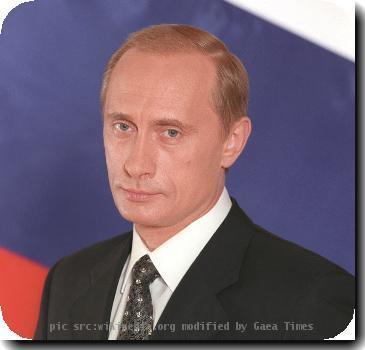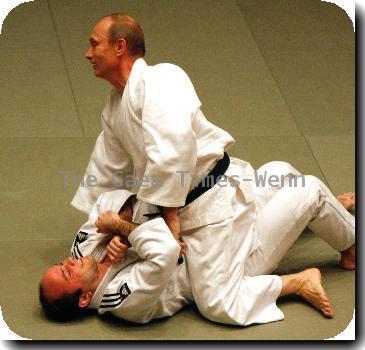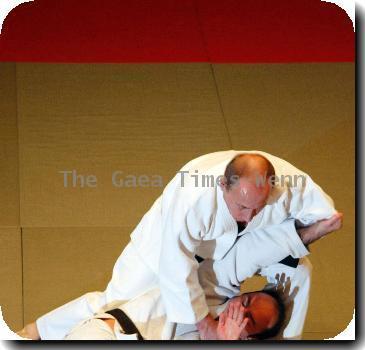Heavy shooting breaks out in Kyrgyz capital after president will not admit defeat by uprising
By Peter Leonard, APThursday, April 8, 2010
Heavy shooting breaks out again in Kyrgyz capital
BISHKEK, Kyrgyzstan — The president of Kyrgyzstan declared from hiding Thursday that he would not surrender to a violent uprising that put the opposition in control of much of the country, home to a U.S. air base key to the war in nearby Afghanistan.
Just after he spoke, automatic weapons fire broke out in the capital miles from the Manas facility, where flights were at least temporarily halted and troops were confined to the base.
It was not clear if Kyrgyz forces controlled by the opposition in Bishkek were battling loyalists of President Kurmanbek Bakiyev, or simply firing to deter looters after nightfall. There appeared to be little evidence of armed men loyal to Bakiyev in the capital before dusk.
The opposition has seized vital official buildings in Bishkek and elsewhere and was giving orders to at least some security forces, declaring it controlled four of the nation’s seven provinces. Opposition leader Roza Otunbayeva said parliament had been dissolved and she would head an interim government that would rule for six months until elections were held. She urged Bakiyev to resign.
Bakiyev, who has fled the northern capital for his stronghold in the south, told a Russian radio station that “I don’t admit defeat in any way.” But he also said he recognized that “even though I am president, I don’t have any real levers of power.”
Although the opposition has previously voiced objection to Manas, Otunbayeva said there were no plans yet to review the lease that runs out in July and her government would meet U.S. diplomats for talks in Bishkek.
“Give us time, it will take time for us to understand and fix the situation,” Otunbayeva said.
Associated Press reporters could hear sustained shooting every few minutes from different directions in Bishkek, along with some single shots. Lights in most buildings including hotels were put out over fears they would attract gunfire.
U.S. military officials said Kyrgyzstan halted flights for 12 hours Wednesday at the Manas air base, confining troops to the base, and did not say if flights had resumed. There are about 1,100 troops there including contingents from Spain and France, also supporting NATO operations in Afghanistan.
This mountainous former Soviet republic exploded Wednesday after protesters furious over corruption and soaring utility bills stormed government buildings in Bishkek. Riot police fired straight into crowds. The Health Ministry said at least 74 people were killed and 400 people hospitalized. After hours of clashes the opposition seized vital official buildings in the capital and elsewhere and was giving orders to significant numbers of security forces.
Bakiyev was emphatic Thursday that he was still the elected leader of the nation of 5 million people that has been courted by China, Russia and the U.S. for its proximity to Afghanistan and resource-rich neighboring nations.
“I do not intend to relinquish power. I see no point,” he said, adding that his re-election nine months ago proved he still had popular support.
Since coming to power in 2005 amid street protests known as the Tulip Revolution, Bakiyev had ensured a measure of stability, but the opposition said he did so at the expense of democratic standards while enriching himself and his family.
He gave his relatives, including his son, top government and economic posts and faced the same accusations of corruption and cronyism that led to the ouster of his predecessor, Askar Akayev.
Even though his security forces fired into crowds of demonstrators a day earlier, killing dozens and wounding hundreds, Bakiyev seemed to rule out further violence.
“You think the president elected by the people will take up arms against the people? What nonsense,” he said.
Asked why he fled Bishkek, he said: “I wouldn’t have left, but when they started firing on my windows, it was only by chance that I avoided injury.”
Otunbayeva, the former foreign minister, said the president was in the southern region of Jalal-Abad, the heart of his political stronghold. This raised concerns that Bakiyev could try to secure his own survival by exploiting the country’s traditional split between the more urban north and the rural south.
Eyewitnesses in southern Kyrgyzstan told The Associated Press that the situation there was tense and unstable, and the region had both armed men who appeared to be still supporting Bakiyev along with opposition supporters.
The new interim defense minister said the armed forces had joined the opposition and will not be used against protesters.
“Special forces and the military were used against civilians in Bishkek … and other places,” Ismail Isakov said. “This will not happen in the future.”
In 2009, Kyrgyzstan said U.S. forces would have to leave Manas, a decision made shortly after Russia granted Kyrgyzstan more than $2 billion in aid and loans. The government later reversed its stance and signed a one-year deal with the U.S. that raised the rent to about $63 million a year from $17 million.
The U.S. is also paying $67 million for airport improvements and navigation systems and another $51.5 million to combat drug trafficking and terrorism and promote economic development.
Leonid Bondarets, who has been affiliated with the Sweden-based Central Asia and the Caucasus think tank, said as long as Bakiyev did not formally resign, there is room for trouble.
“It’s hard to predict what is going to happen because Bakiyev hasn’t stepped down,” Bondarets said in a telephone interview from Bishkek. “The situation is still tense.”
Kyrgyzstan, which shares a 533-mile (858-kilometer) border with China, is also a gateway to other energy-rich Central Asian countries where China, Russia and the U.S. are competing fiercely for dominance. It is a predominantly Muslim country, but it has remained secular.
In a tentative sign that Russia may lend its support to the opposition forces, Prime Minister Vladimir Putin called Otunbayeva on Thursday to talk. Any suggestion that Russia is backing the new leadership adds to the pressure on Bakiyev to step down.
Russia sent in 150 paratroopers to its base to ensure the safety of the 400 military personnel and their families there, Russian state media reported.
In Bishkek, most of the government buildings in the capital, as well as Bakiyev’s houses, have been looted or set on fire and two major markets were burned down. A paper portrait of Bakiyev at government headquarters was smeared with red paint. Obscenities about him were spray-painted on buildings nearby.
Associated Press writers Leila Saralayeva and Yuras Karmanau in Bishkek, Anita Chang in Beijing, Pauline Jelinek in Washington, Deborah Seward in Paris and Lynn Berry, Mansur Mirovalev, Nataliya Vasilyeva and David Nowak in Moscow contributed to this report.
Tags: Afghanistan, Asia, Bishkek, Central Asia, China, East Asia, Eastern Europe, Europe, Greater China, Kyrgyzstan, Military Affairs, North America, Protests And Demonstrations, Roza otunbayeva, Russia, United States, Violent Crime, Vladimir Putin


